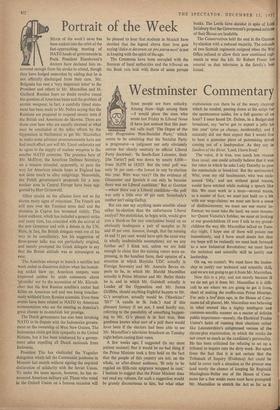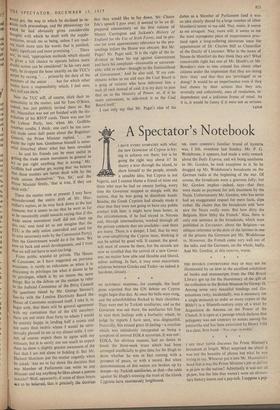Westminster Commentary
SOME people are born unlucky. Among them—high among them —I would place the man who wrote last Friday in Liberal News (I have just noticed that this jour- nal calls itself 'The Organ of the only Progressive Non-Socialist Party,' which seems to be admitting that the Socialist Party is progressivc—a judgment not only obviously untrue but clearly contrary to official Liberal Party doctrine): 'In South-East Leicester, their [the Tories] poll was down by nearly 8,000— from 26,070 to 18,023. But the total poll was only 56 per cent.—the lowest in any by-election this year. WHY WAS THAT? On the evidence of Gloucester and Ipswich it can only be because there was no Liberal candidate.' But at Garston —where there was a Liberal candidate—the poll was only a little over 49 per cent. Somebody's mother isn't using Gallup.
But can one say anything more sensible about either by-election than the unfortunate Liberal analyst? No statistician, to begin with, would give you a thank-ee for any conclusions based on so obviously inadequate a pair of samples as 56 and 49 per cent. Assume, though, that the missing 44 and 51 per cent. would have split the same way (a wholly inadmissible assumption); are we any further on? I think not, unless we are bold enough to claim that the missing voters were ex- pressing, in the handiest form, their opinion of a situation in which Hoylake UDC actually is Foreign Secretary and Mr. Aneurin Bevan ex- pects to be, in which Mr. Harold Macmillan actually is Prime Minister and Mr. Butler thinks he is, and in which Mr. Gaitskell actually is Leader of the Opposition and Mr. James Griffiths, should anything frightful happen to Mr. G.'s aeroplane, actually would be. (`Hawkins!' `Sir?' A candle to St. Jude.') And if this pleasant fantasy (I am not, I need hardly say, referring to the possibility of something happen- ing to Mr. G.'s plane) is in fact true, then goodness knows what sort of a poll there would have been if the electors had been able to see Mr. Macmillan's television broadcast on Tuesday night before casting their votes.
A few weeks ago, I suggested (in my most patient manner) that it would be no bad thing if the Prime Minister took a firm hold on the fact that the people of this country are not, on the whole, an after-dinner audience, 'fit only to be regaled on fifth-rate epigrams wrapped in cant.' I hesitate to suggest that the Prime Minister does not read my column, for such a suggestion would be grossly discourteous to him, but what other explanation can there be of the weary claptrap which he exuded, peering down at his script for the spontaneous asides, for a full quarter of an hour? I once heard Dr. Dalton, in a Budget-day broadcast; say 'we've got to export a jolly lot this year' (plus ca change, incidentally), and I naturally did not then expect that I would live to hear a gummier piece of patronising drivel coming out of a loudspeaker. As they say in Sanders of the River, 'Lord, I have lived.'
The voice, it is true, was much less viscous than usual; one could actually believe that it was the voice in which he asks Lady Dorothy to pass the marmalade at breakfast. But the sentiments!, Why, even my old headmaster, who was nick- named 'Oily,' and not without good reason, would have retched while making a speech like this. We must work in a team—several teams, as a matter of fact; we must fjust hold on a bit with our wage-claims; we must not have a sense of disillusionment; we must use our moral in- fluence; we must take the lead; we must remem- ber Queen Victoria's Jubilee; we must sit looking at our grandchildren (if ever I talk to my grand- children the way Mr. Macmillan talked on Tues- day night, I hope one of them will poison me immediately, and I have small doubt but that my hope will be realised); we must look forward to a new Industrial Revolution; we must have the technical and scientific skill to justify our leadership.
Oh no, we mustn't. We must have the leader- ship to justify our technical and scientific skill, and we are not going to get it from Mr. Macmillan.
Now this is a pity, and not merely because if we do not get it from Mr. Macmillan it is diffi- cult to see where we are going to get it from, short of making the muffin-man Prime Minister. For only a few days ago, in the House of Com- mons (of all places), Mr. Macmillan was behaving in what seemed like a highly intelligent and common-sensible manner on a matter of definite public importance—namely, the Electrical Trades Union's habit of running their elections rather like Leicestershire's enlightened version of the eleven-plus examination, in which the marks do not count so much as the candidate's personality. He has been criticised for refusing to set up a tribunal to inquire into the dirty work. But apart from the fact that it is not certain that the Tribunals of Inquiry (Evidence) Act could be held to cover such a situation as the present one (and surely the chance of keeping Sir Reginald Maningham-Buller out of the House of Com- mons for a few weeks more must have prompted Mr. Macmillan to stretch the Act as far as it in- stitute go), the way in which he declined to in- .ute such proceedings, and the phraseology (to thought) he had obviously given considerable h _ °ught) with which he dealt with the supple- mentaries, struck me as being, unless I am read- !) Much more into his words that is justified, n_ rIgillY significant and most promising. `. . . There ,aee, he said, 'appropriate methods which should _ be given a full chance to operate before more drastic action can be considered.' In his very next r_ePlY, he dropped the bone smartly on the TUC's carpet by saying, `. . . primarily the duty of the bodies of the union . . . but for which other bodies have a responsibility which, I feel sure, they will not shirk.'
Now the TUC will, of course, shirk their re- !Ponsibility in the matter, and Sir Tom O'Brien, 1... was indeed, has just publicly invited them to. But Ir. Macmillan w not yet finished with the dis- tribution of his RSVP cards. There was one for the Labour Party, too; when Mr. Griffiths (another candle, I think; one can't be too care- ttil) made some daft point about the Registrar- General,' the Prime Minister replied, `. . . no doubt the right hon. Gentleman himself is some- what disturbed about what has been revealed • • • he and his friends can be most useful in getting the trade union movement in general to tryto - put right anything that is wrong.' Mr. Griffiths had another go, saying that 'we believe that these matters are better dealt with by the trade unions themselves."Yes, Sir,' said the Prime Minister firmly, 'that is true, if they are dealt with.'
There the matter rests at present. I may have Misunderstood the entire drift of Mr. Mac- millan's replies, or he may back down at the last Moment; but it seems to.me that he went as far as he reasonably could towards saying that if the trade union movement itself did not clean up this rats' nest (and let us not imagine that the ETU is the only union controlled and used for its own unsavoury ends by the Communist Party), then the Government would do it for them. We now sit back and await developments, and I trust that we will not have to wait too long. From public scandal -to private. The House of Commons, as I have suggested on previous Occasions, is rarely so ridiculous as when it is discussing its privileges (or what it deems to be its privileges, which is by no means the same thing): But in the debate on the motion to refer to the Judicial Committee of the Privy Council the questions raised by Mr. George Strauss's hoo-ha with the London Electricity Board the House of Commons surpassed itself. I take it, to begin with, that there will be general agreement with my contention that of the 630 members there are not more than forty to whom I would be entirely happy in lending half a crown and not more than twelve whom I would be unre- servedly pleased to see at my dinner-table. I can- not, of course, expect them to agree with my estimate, but it is surely not too much to expect them to show a slightly greater awareness of the fact that I am not alone in holding it. But Mr.
Herbert' Morrison put the matter cogently when he asked, 'Are we to lay down the doctrine that any Member of Parliament can write to any Minister and say anything he likes about a person outside?' Well, apparently, if some of these boyas are to be believed, that is precisely the doctrine that they would like to lay down. Mr. Chuter Ede's speech I pass over; it seemed to be an ill- prepared commentary on the first volume of Messrs. Carrington and Jackson's History of England for the Use of Sixth Forms, and its pre- cise (or even approximate) relevance to the pro- ceedings before the House was obscure. But Mr. Paget! Mr. Paget said, 'It is the right of the in- dividual to blow his top against Government and have his complaint—reasonable or unreason- able, wild or sober—brought to the fountainhead of Government.' And he also said, 'If my con- stituent writes to me and says the Coal Board is a gang of twisters who have delivered him a sack of rock instead of coal, it is my duty to pass that on to the Ministry of Power, or, if it be more convenient, to side-track it to the Coal Board itself.'
I can only say that Mr. Paget's idea of his duties as a Member of Parliament (and it was an idea clearly shared by a large number of other Members) seems to me odd. Nay, more; it seems to me arrogant. Nay, more still; it seems to me the most outrageous piece of impertinence prac- tised upon a long-suffering electorate since the appointment of Dr. Charles Hill as Chancellor of the Duchy of Lancaster. Who in the name of Simon de Montfort do they think they are? What conceivable right has one of Mr. Heath's or Mr, Bowden's men to toss around lies about other citizens under the impression that they are doing their 'duty' and that they are 'privileged' in so doing? It would be an impertinence even if they had shown by their actions that they are, severally and collectively, men of resolution, in- dependence and a judicious frame of mind. As it is, it would be funny if it were not so serious.







































 Previous page
Previous page